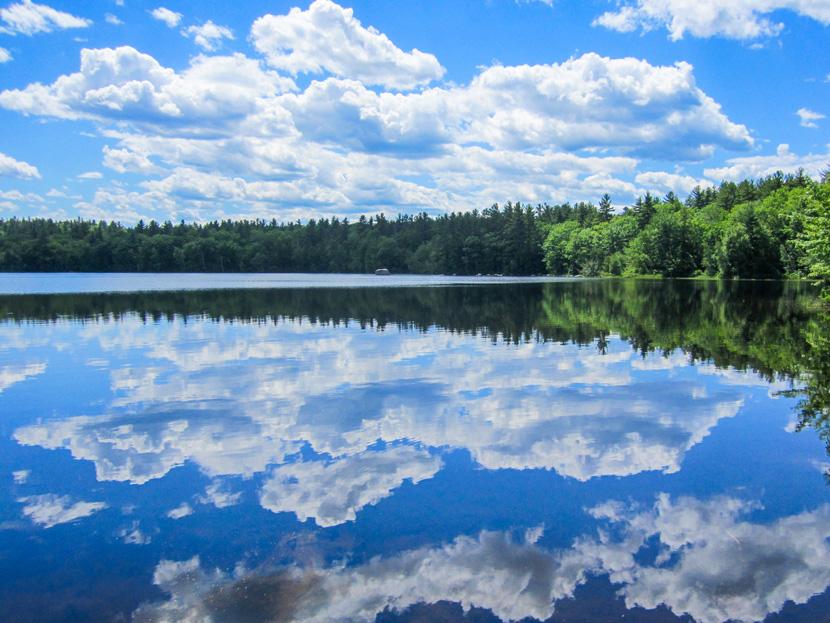Society for the Protection of New Hampshire Forests and Manchester Water Works protect 1,942 acres in Candia and Hooksett
- Tags:
- Land Conservation,
- Clean Water

The Manchester Water Works Project surrounding Tower Hill Pond in Auburn, NH has received wide-ranging and enthusiastic support from the local conservation commissions, through donations from generous donors, and grants from LCHIP, the Merrimack Conservation Partnership, and the Department of Environmental Services. Photo credit: Brian Hotz/Forest Society.
Manchester Water Works (MWW) and the Society for the Protection of New Hampshire Forests (Forest Society) worked together to permanently conserve 1,942 acres surrounding Tower Hill Pond in Candia and Hooksett. Thanks to multiple grants and private donors, the Forest Society acquired a conservation easement on the land that MWW will continue to own and manage. The nearly 2,000 acres is part of the 8,000 acres the Manchester Water Works owns and manages to ensure clean drinking water to the City of Manchester and surrounding towns.
For maps of trails around Tower Hill Pond, visit Manchester Water Works' website.

“The Forest Society has long recognized that one of the ways that our work protecting forests connects to people’s everyday lives is by providing clean drinking water,” states Jane Difley, president/forester for the Forest Society. “We’re proud to have been selected to protect this important watershed.”
“The purchase of the easement by the Forest Society provides a guarantee that this critical land will not be developed now or in the future,” states Brian Hotz, vice president for land conservation for the Forest Society.

“The NH Department of Environmental Services (NHDES) encourages all water systems to work with partners in the land conservation community to improve the protection of their sources,” states Sarah Pillsbury, Administrator of the NHDES Drinking Water and Groundwater Bureau. “On a statewide level, three-quarters of our high-priority water supply lands are unprotected. The Tower Hill Pond project is a great example of water suppliers and the land conservation community working together to protect water supply sources for the future and NHDES looks forward to supporting other similar projects.”
While clean drinking water was a major impetus for the project, the land also offers significant wildlife habitat, including at least a dozen rare or threatened plants and animal species designated by the New Hampshire Natural Heritage Bureau. The list includes common loons, a kettle bog, dry Appalachian oak forest, and other plants.
Minutes from the City of Manchester, the land offers area residents numerous recreational opportunities. Offering a six-mile trail system of fire roads used by mountain bikers, hikers, dog walkers, and runners the property is used by thousands each year. There are also several state designated snowmobile trails. The pond, open to kayaking and fishing, is stocked with trout.
“Tower Hill Pond is an ideal setting for Manchester residents and visitors to participate in an array of four-season outdoor recreation opportunities, while at the same time providing clean drinking water,” states Mayor Joyce Craig, City of Manchester. “I commend the partnership between the Society for the Protection of New Hampshire Forests and the Manchester Water Works in preserving this natural resource by guaranteeing the land will not be developed and protecting the pristine water quality for future generations.”
For historians, the property is home to old stone foundations from the Maple Falls Brook mill. The site was utilized as early as 1796 (known at the time as Steven’s Mill), with a natural waterfall with water flowing over stepped ledges to power the mill.
The project was funded by grants from the Department of Environmental Services’ Water Supply Land Protection Grant Program, Aquatic Resource Mitigation Fund Program, and the New Hampshire Land and Community Heritage Investment Program. Additional, funding was provided by the Merrimack Conservation Partnership and numerous private individuals.
In 2007, Manchester Water Works and the Forest Society jointly conserved 460-acres featuring approximately four miles of frontage along Lake Massabesic in Auburn, including Battery Point, the “crown jewel” of the shorefront.
